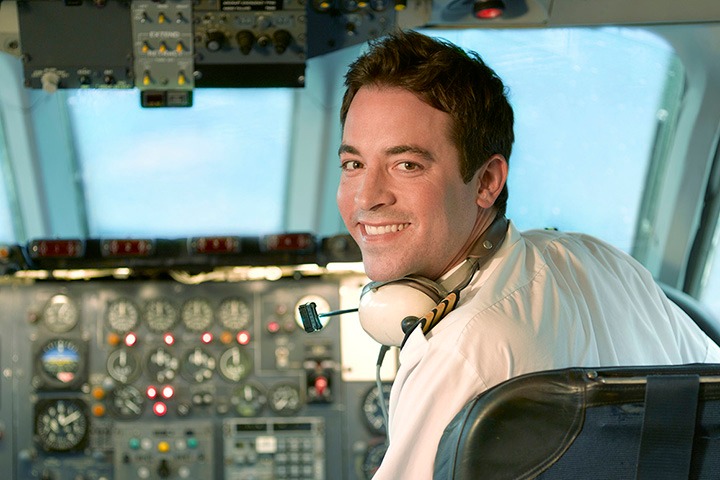- Go to homepage
- Course areas
- Aviation and Aircraft Maintenance
- Diploma of Aviation (Instrument Rating)
Back to:Aviation and Aircraft Maintenance

Overview
About this course
Give your commercial pilot licence an upgrade and develop the skills you need to operate an aircraft. Take to the skies with confidence in various difficult conditions, carry out instrument approaches and departures as well as en route procedures.
Outcomes
What you'll gain
Learning outcomes
Through a mixture of theory and practical course work, learn to:
Plan, manage and operate a flight under instrument flight rules
Conduct 2D, 3D, and GPS approaches
Perform instrumental arrivals, visual circling approaches and departure procedures
Course outcomes
Gain practical experience and develop specialist skills that give you an advantage in the job market.
A nationally recognised Diploma qualification
50 total hours of flying which includes 40 instrument flight hours
Preparedness to meet CASA certification requirements for Multi-Engine Command Instrument Rating endorsement
Suitability
Is this course right for you?
Entry requirements
This course requires evidence of previous experience or study before you can enrol.
Must attend a pre-screening interview to assess suitability and commitment
Be at least 18 years old by week 52 of the course so you can undertake the CPLA Flight Test
A current Class 1 Australian Flight Crew Medical through Civil Aviation Safety Authority (CASA) Aviation Medicine
A current Private Pilot Licence (PPL) or Commercial Pilots Licence (CPL)
Meet requirements for an Aviation Reference Number (ARN) and an Aviation Security Identification Card (ASIC)
Must meet Language, Literacy and Numeracy (LLN) levels of Australian Core Skills Framework (ACSF) 4 and above
That you are able to attend a pre-screening interview to assess your suitability and commitment
Completion requirements
During your study you’ll need to provide your teacher with the following evidence:
At the beginning of the course, you will have a medical examination to ensure you are fit to fly. Throughout the course, you will be subject to random drug and alcohol testing as an industry requirement.
Entry recommendations
To be prepared for this course, we recommend that you have:
Ability to interpret weather forecasts and briefings
Understanding and ability to apply NOTAMs and operational information
Ability to interpret and understand instrument approach charts
Ability to think ahead and strategically plan as weather changes in-flight
Ability to apply your strong foundational knowledge of math and physics
We tailor our courses to meet local community needs, so some campuses may have extra entry requirements. Check your preferred location for details. Need help preparing? Contact us for support.
Find Your Fit
This simple tool guides you to a suitable course level based on your foundation skills and confidence.
Pathways
Future career and study options
Career pathways
Our graduates go onto roles like: pilot for a commercial airline, flying instructor, aerial application pilot, charter pilot and simulator instructor.
Licensing
This qualification prepares you for CASA testing to be certified as a commercial pilot and to gain your Part 61 Flight crew licence
Study pathways
Take your study further with other courses offered at TAFE NSW:
Previous study1 Course
Begin here to gain experience and confidence in this study area.
Further study0 Courses
Advance your skills to take your career to the next level
The Diploma of Aviation (Instrument Rating) does not have any post-graduate courses.
Related study0 Courses
Strengthen your expertise and gain specialist skills to expand your employability.
The Diploma of Aviation (Instrument Rating) does not have any related courses.
Your experience counts
At TAFE NSW, we recognise your previous study and work experience. You can apply for recognition of prior learning or a credit transfer with any of our courses. If you're successful you'll get your qualification faster.
Units
Units taught in this course
Courses are made up of a combination of both core and specialty units. In the Diploma of Aviation (Instrument Rating) qualification, you’ll need to successfully complete 14 units of competency, including 13 core and 1 speciality units.
Please note, not all specialty units are offered at every TAFE NSW location. It is highly recommended that you check with your preferred campus for information about the specialty units offered at that location.
Core units - 13
Core units are central to the job outcomes of a particular industry or occupation. These are the units industry has agreed are essential to be capable and qualified at a particular study level.
Implement threat and error management strategiesAVIF0029
Manage safe flight operationsAVIF0030
Plan a flight under instrument flight rulesAVIH0013
Navigate aircraft under instrument flight rulesAVIH0017
- ... 4
TAFE NSW services
Facilities and support
TAFE NSW provides support services across all campus locations and online. Whatever your needs or circumstances, we have the people, resources, counselling and facilities to support you in focusing on your studies.
TAFE NSW Disability Support Service
TAFE NSW Language, Literacy and Numeracy (LLN) support
TAFE NSW Aboriginal Support; Learner support (ABE)
TAFE NSW Careers, Counselling and Pathways Service
TAFE NSW Libraries
Scholarship programs - be supported as you explore your talents and fulfil your potential
Read&Write literacy and study support software is available free for all TAFE NSW students to use while studying on campus and at home
LinkedIn Learning - an online resource which offers innovative courses and tutorials to improve your personal and professional skills
Student associations - get social with our student community
Study options